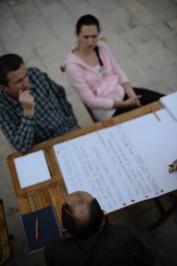The Basic Training in Peace-Building Programme that CNA has been organising since 1997 has undergone numerous transformations and changes, in fact, it keeps constantly changing, no training is identical to previous training, exercises are not repeated, instead adaptations are made depending on the group. We call it a “training” precisely because of the opportunities for learning, personal transformation, exercise (a special segment of the training is devoted to this), and because it gives the participants the sense that by changing themselves, their views and responses, they can recognise and change the societies they live in. This is a way to motivate and encourage, but also raise awareness through workshops and exercises that show them how to recognise social mechanisms and processes and effect creative change in their environments.

I begin the report with this statement, because we get the impression that some participants that have attended other programmes often come to our training expecting complete solutions, lectures by “experts” and “recipes” applicable in any and all situations. And then, albeit rarely, but it does happen, at the training they close up, they are unable to give anything of themselves, their thoughts and dilemmas, because they fear their answers will be wrong or judged…

This deprives us of valuable room for exchange, and for learning, which ultimately leads to frustration and a feeling that we got nowhere, both on the part of the team of trainers and on the part of some participants. In today’s world, which is in some respects more global and open, but in other more closed off and alienating to the individual, when we try to find ourselves, we often end up with a see of proposed solutions and models of thinks that make us loose our personality and originality, there is less and less space for an individual to maintain the right to be different. It takes skill to wade through everything learned but unexamined to get at the core of the person and the essence of what a human being is. One part of the group at the Basic Training in Peace-Building held in Ulcinj from 18 to 28 October 2013 presented a problem for the team of trainers in terms of recognising their way of thinking and why they do not share their impressions transparently, with the entire group in a process where, even when they are silent, they are still participating.
Despite these difficulties, we come out of the training strengthened in various ways and though various open processes that have resulted in new ideas, knowledge and insights, which, I believe, once transferred to micro-environments will start changing social processes. They may not be visible in the public arena, but they are significant for individuals and their immediate environment.

Veterans from the Army of BiH and the Army of RS shared valuable experience from their participation in the war. Their experience and desire to work on peace-building in their local communities provided incentives for the other participants. Also, I believe it is a great leap that the participants were able to recognise the problems in their communities and in others, to jointly analyse them and think about the next steps in building trust and, ultimately, peace in the region. The initial discussions at the workshops intended to introduce everyone to the contexts of Macedonia, Kosovo, Croatia, Serbia (including Preševska dolina and Sandžak), Bosnia and Herzegovina, the countries where the training participants were from, spilled over into the free time, giving an additional feeling of security and understanding and the need to understand others to the workshops themselves. This training saw a pronounced need to hear from the other, which created a sense of security, at least for the majority of the group. This security gave rise to solidarity and the need to watch out for others, and in some cases there was a lack of opposition, but this did not give the impression of problems being concealed, but rather that they were being taken into consideration. This was best illustrated at the Facing the Past workshop for which the participants demonstrated the highest degree of motivation and which examined in depth the events from the past of the region and its societies that have consequences on the present and the future.

Finally, apart from these impressions, we have had another very creative and inspiring training, both for CNA, as the organisers, and for all the participants. There is only one small regret that due to a late cancellation one spot on the training was left vacant. Also, working in Ulcinj, at the “Dvori Balšića” and “Palata Venecija” hotels was, as always, top-quality and inspirational, because the service and hospitality are at a highly professional level.
Katarina Milićević